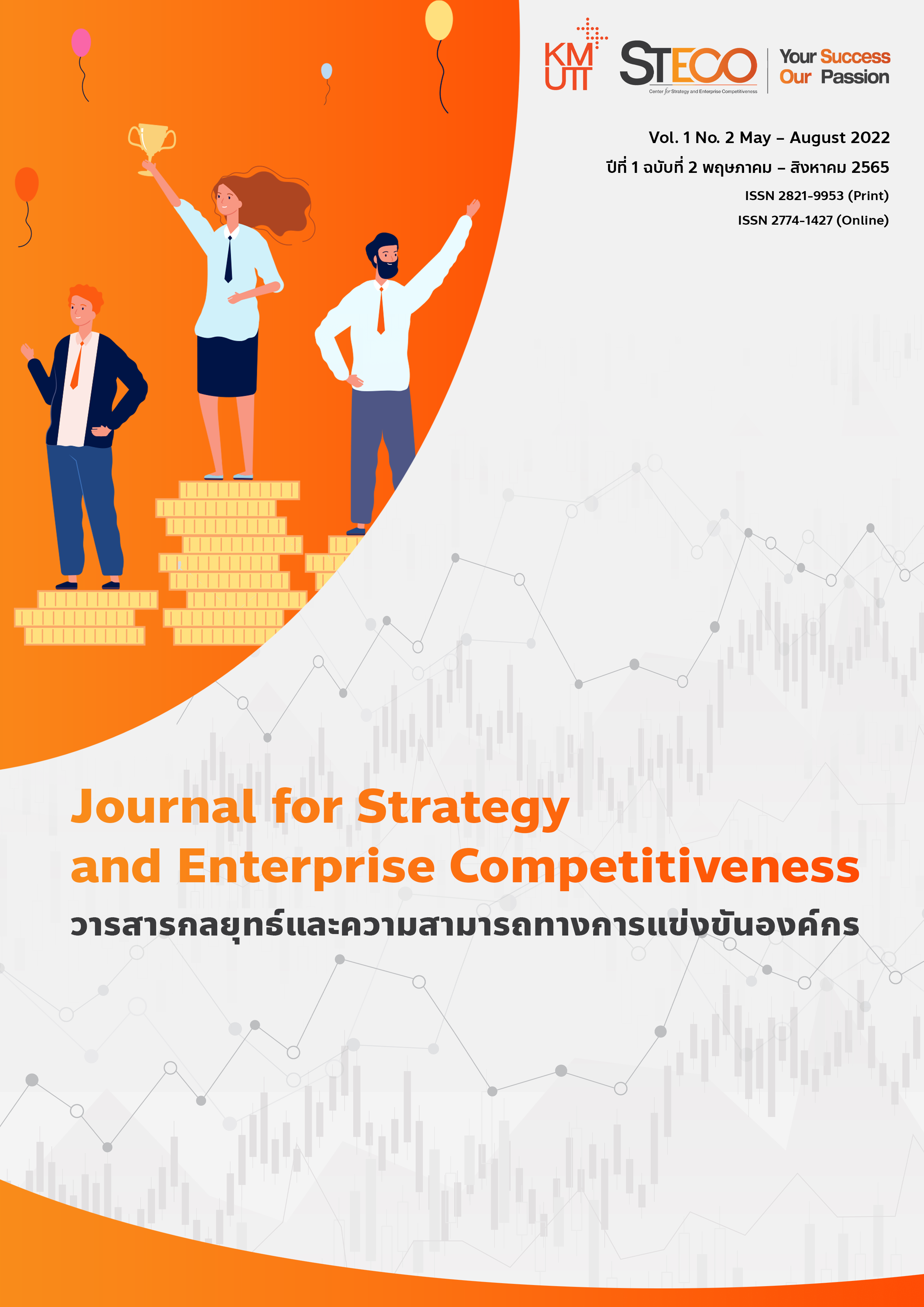The Effect of Job Satisfaction, Organizational Commitment, and Organizational Citizenship Behavior on Effectiveness of Electrical Parts Industries in Thailand
Keywords:
Job Satisfaction, Organizational Commitment, Organizational Citizenship Behavior, Organizational EffectivenessAbstract
This study investigates job satisfaction, organizational commitment and organizational citizenship behavior effect on organization effectiveness of electrical parts industries in Thailand are the population of the study. Furthermore, this research, a source of database is used as electrical parts industries in Thailand. The returned and valid questionnaire results were 333 samples and key participant is human resource managers or general managers in each of company. The results show that job satisfaction and organizational commitment influence on organizational citizenship behavior. The three dimensions of organizational citizenship behavior: altruism, compliance, loyalty some significant an effect on organizational effectiveness. Also, job satisfaction, organizational commitment and organizational citizenship behavior has a potential positive influence on organizational effectiveness. Potential discussion with the research results is effectively implemented in the study. Theoretical and managerial contributions are explicitly provided. Conclusion and suggestions are also providing for further research.
References
Allen, N. J. and Meyer, J. P. (1990). The measurement and antecedent of affective, continuance and normative commitment to the organization. Journal of Occupational Psychology, 63(1), 1-18.
Borman, W. C., and Motowidlo, S. J. (1997). Task performance and contextual performance: The meaning for personnel selection research. Human performance, 10(2), 99-109.
Castellano, S., Chandavimol, K., Khelladi, I., and Orhan, M. A. (2021). Impact of self-leadership and shared leadership on the performance of virtual R&D teams. Journal of Business Research, 128, 578-586.
Castro, C. B., Armario, E. M. and Ruiz, D. M. (2004). The influence of employee organizational citizenship behavior on customer loyalty. International Journal of Service Industry Management, 15(1), 27-53.
Churchill Jr, G. A., Ford, N. M., and Walker Jr, O. C. (1974). Measuring the job satisfaction of industrial salesmen. Journal of Marketing Research, 11(3), 254-260.
Cranny, C. J., Smith, P. C., and Stone, E. (1992). Job satisfaction: How people feel about their jobs.
George, J. M., and Brief, A. P. (1992). Feeling good-doing good: A conceptual analysis of the mood at work-organizational spontaneity relationship. Psychological bulletin, 112(2), 310.
Graham, J. W. (1991). An essay on organizational citizenship behavior. Employee responsibilities and rights journal, 4(4), 249-270.
Hair J.F., Black W.C., Babin B.J., Anderson R.E. and Tatham R.L. (2006). Multivariate data analysis. (6th Edition), New Jersey: Pearson Prentice Hall.
Hetty van Emmerik, I.J., Bakker, A.B. and Euwema, M.C. (2008), What happens after the developmental assessment center? Employees' reactions to unfavorable performance feedback, Journal of Management Development, 27(5), 513-527. https://doi.org/10.1108/02621710810871826
Juneja, P. G. (2015). Management as a Process. Management Study Guide Content Team. Retrieved from https://www.managementstudyguide.com/management_process.htm
Lorenza Errighi and Charles Bodwell. (2017). Electrical and electronics manufacturing in Thailand: Exploring challenges and good practices in the workplace. ILO Asia - Pacific Working Paper Series, 9-41.
Luthans, F., Luthans, B. C., and Luthans, K. W. (2021). Organizational Behavior: An Evidence-Based Approach Fourteenth Edition. IAP.
Maltz, A. C., Shenhar, A. J., and Reilly, R. R. (2003). Beyond the balanced scorecard: Refining the search for organizational success measures. Long range planning, 36(2), 187-204.
Moorman, R. H. (1991). Relationship between organizational justice and organizational citizenship behaviors: Do fairness perceptions influence employee citizenship?. Journal of applied psychology, 76(6), 845.
Mowday, R. T., Steers, R. M., and Porter, L. W. (1979). The measurement of organizational commitment. Journal of vocational behavior, 14(2), 224-247.
Nunnally, J.C., and Bernstein, I.H. (1994). Psychometric Theory. 3rd Edition, New York: McGraw-Hill.
Organ, D. W. (1988). Organizational citizenship behavior: The good soldier syndrome. Lexington books/DC heath and com.
Organ, D. W., Podsakoff, P. M., and MacKenzie, S. B. (2005). Organizational citizenship behavior: Its nature, antecedents, and consequences. Sage Publications.
Podsakoff, P. M., MacKenzie, S. B., Paine, J. B., and Bachrach, D. G. (2000). Organizational citizenship behaviors: A critical review of the theoretical and empirical literature and suggestions for future research. Journal of management, 26(3), 513-563.
Smith, C. A. O. D. W. N. J. P., Organ, D. W., and Near, J. P. (1983). Organizational citizenship behavior: Its nature and antecedents. Journal of applied psychology, 68(4), 653.
Trimisat, M. I. (2020). Pengaruh Keadilan Organisasional, Kepuasan Kerja, Dan Komitmen Organisasional Terhadap Organizational Citizenship Behavior (Ocb)(Studi Kasus Pada Pegawai Kantor Pelayanan Pajak Pratama Purworejo). VOLATILITAS, 2(1).
Verianto, D. (2018). Pengaruh Motivasi Kerja Intrinsik Dan Keadilan Prosedural Terhadap Organizational Citizenship Behavior (OCB) Dan Kinerja Karyawan KPP Pratama Purwokerto. Jurnal Ekonomi, Bisnis, dan Akuntansi, 20(3), 1-15.
Williams, L. J., and Anderson, S. E. (1991). Job satisfaction and organizational commitment as predictors of organizational citizenship and in-role behaviors. Journal of management, 17(3), 601-617.
Downloads
Published
How to Cite
Issue
Section
License
Copyright (c) 2022 Journal for Strategy and Enterprise Competitiveness

This work is licensed under a Creative Commons Attribution-NonCommercial-NoDerivatives 4.0 International License.
The opinions appearing in the content of articles of Journal for strategy and enterprise competitiveness. It is the opinion and responsibility of the article author. It is not the opinion and responsibility of the Center for strategy and enterprise competitiveness, King Mongkut's University of Technology Thonburi
Articles, information, content and images, etc., in the Journal for strategy and enterprise competitiveness. It is the exclusive copyright of the Center for strategy and enterprise competitiveness, King Mongkut's University of Technology Thonburi. If an individual or entity wants to distribute all or part of the content or for any action must obtain written permission from the Center for Strategy and enterprise Competitiveness, King Mongkut's University of Technology Thonburi.



